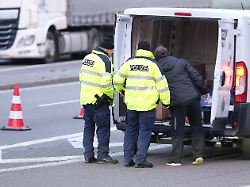No equipment, not flexible
New border controls fail the police union
October 17, 2023, 12:10 p.m
Listen to article
This audio version was artificially generated. More info | Send feedback
Since Faeser’s announcement, federal police have increased their presence at the borders with Poland, the Czech Republic and Switzerland. However, according to the police union, things are going rather badly than well. There is no sign of mobile controls, only “dull, stationary” points, it is said. There is also a lack of technical equipment.
The police union (GdP) is dissatisfied with the way travelers are now being checked at the borders with Poland, the Czech Republic and Switzerland. “Some cross-border roads have been occupied, and this has already led to the first traffic jams,” said the GdP chairman for the federal police, Andreas Roßkopf.
Following the announcement by SPD Federal Interior Minister Nancy Faeser, the union has prepared itself for “flexible, mobile and location-adapted controls” and not for “dull, stationary, fixed checkpoints like at the Austrian border”. But that is what is now being experienced at these border sections – albeit without the necessary equipment for such an approach. The trade unionist said that one should not allow police officers to have to work “under the tailgate” for a longer period of time without any weather protection, without technical equipment and without professionally set up checkpoints.
Investigators and the technical equipment to quickly scan smugglers’ cell phones were also missing. The fact that police officers have now been withdrawn from train stations and airports and sent to the border has led to dissatisfaction among those affected, said Roßkopf.
On Monday, Faeser registered stationary controls with the EU Commission for an initial period of ten days at the borders with Poland, the Czech Republic and Switzerland. Shortly afterwards there were the first controls directly at the border. According to the ministry, the notification can be extended for a total of two months. In security circles, however, it is expected that the controls will later be announced for a longer period of time.
According to the Federal Ministry of the Interior, the Federal Police detected around 98,000 unauthorized entries into Germany from the beginning of January to the beginning of October. The minister emphasized that every vehicle should not be stopped at the affected border crossings around the clock in the future. She said: “The Federal Police can now flexibly deploy the entire package of stationary and mobile border police measures, depending on the current situation.” The controls should have “as little impact as possible on the everyday life of commuters, on trade and on travel.” The GdP welcomed the decision for notification and flexible controls on changing priorities.
